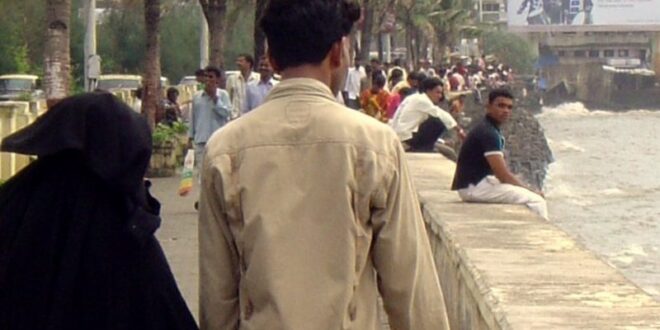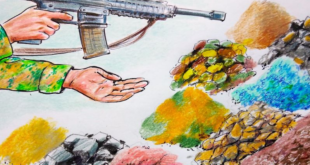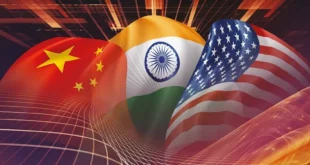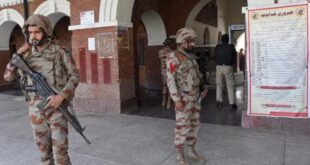The Indian government has been faced with a strange dilemma since the Taliban returned to power in Afghanistan.
On Aug. 31, within hours of US forces departing the war-torn nation, India’s Ministry of External Affairs (MEA) announced that its envoy to Qatar, Deepak Mittal, had met with the head of the Taliban’s political office, Sher Mohammad Abbas Stanekzai.
This triggered a debate about India toeing a pragmatic line and heading toward establishing formal relations with the Taliban, though the MEA said the discussions focused on safety, security and the early return of Indian nationals stranded in Afghanistan.
The Narendra Modi government has always viewed the Taliban as a terror organization and refused to adopt the softer line that required it to differentiate between “good Taliban” and “bad Taliban.”
Some Hindu hardliners would have nothing of its new, softer approach and went on the offensive.
“You want to spin charkha to Taliban, please try it,” Major General G.D. Bakshi, a retired army officer, said as if throwing a challenge to the Indian government.
The charkha, or spinning wheel, is regarded as the physical embodiment and symbol of Mahatma Gandhi’s constructive resistance to British colonial power and Bakshi only meant to convey that the Taliban cannot be influenced by Gandhian philosophy.
However, a dozen public figures including veteran politicians, retired bureaucrats, activists and journalists said the Modi government should have a deeper engagement with the Taliban.
“No country in the region should be excluded from nor isolate itself from collaborative efforts to bring peace in Afghanistan and promote national reconciliation,” they said in a written appeal.
The dilemma witnessed in the higher echelons of capital New Delhi was reflected on the ground, among the nation’s Muslims who constitute slightly less than 14 percent of India’s population of 1.3 billion and are often at the receiving end of Hindu extremists’ hate.
Some were apparently ecstatic at the Taliban takeover of Afghanistan and couldn’t hold back. A number of Muslim clerics openly endorsed the Taliban takeover and even sought an end to the concept of school co-education in their home country.
Jamiat Ulema-e-Hind, an organization of Islamic scholars belonging to India’s Deobandi school of thought from whom the Taliban draw their ideology, called for separate schools for boys and girls and urged non-Muslims to stop sending their daughters to co-education schools or colleges.
This was necessary, the organization said, to “keep them away from immorality and bad behavior.”
Samajwadi Party lawmaker Shafiqur Rehman Burq sought to justify events in Afghanistan by saying: “When India was under British rule, our country fought for freedom. Now the Taliban wants to free their country and run it.”
The police in the north Indian state of Uttar Pradesh, ruled by the pro-Hindu Bharatiya Janata Party (BJP), initiated penal action against the veteran socialist leader.
The BJP and other pro-Hindu outfits were quick to jump on the bandwagon, expressing apprehension about the “attempt to Talibanize” India.
Soon the hashtag #GoToAfghanistan began trending on Indian social media, with some Muslims countering it with their support for the Taliban.
India’s top actor Naseeruddin Shah posted a video on Twitter calling on India’s Muslims to introspect.
“Even as the Taliban’s return to power in Afghanistan is a cause for concern for the whole world, celebrations of the barbarians in some sections of the Indian Muslims is no less dangerous,” he warned.
“Every Indian Muslim should ask themselves if they want reform and modernity in Islam or the barbarian values of the past few centuries.”
The last fortnight has witnessed how the disturbing events and ensuing humanitarian crisis in Afghanistan have impacted both Hindus and Muslims in multireligious and multilingual India.
The worst thing is that this mob mentality is now invading the country’s premier institutions such as the Jawaharlal Nehru University (JNU), which has decided to introduce a new optional course on fighting terrorism for its engineering students.
The title of the course, “Counter-Terrorism, Asymmetric Conflicts and Strategies for Cooperation Among Major Powers,” drew criticism from intellectuals and political leaders.
Marxist leader Brinda Karat said the BJP government is only trying to impose its Hindutva agenda on students but JNU vice-chancellor M. Jagadesh Kumar defended his decision by saying the course was intended to equip India with “adequate responses in the case of any eventuality.”
“The way things have unfolded in India’s neighborhood is proving highly detrimental to India’s national security,” he said in a not-so-subtle reference to Afghanistan in a statement.
Pro-Hindu organizations including academic and student bodies welcomed the JNU decision.
“Counter-terrorism requires the use of advanced technology to gather information, collect intelligence inputs, analyze and use appropriate technical solutions in the best possible manner. An engineer entrusted with such a task is expected to have basic knowledge of the objectives of terror outfits,” wrote senior BJP leader Seshadri Chari in an article for the online news portal The Print.
The only takeaway from the deluge of recent unsavory events and statements seems to be that democratic India needs to learn from what’s happening in Afghanistan and keep its homegrown fundamentalism in check.
 Eurasia Press & News
Eurasia Press & News




